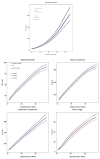Maternal Depressive Symptoms, Perceived Stress, and Fetal Growth
- PMID: 28393386
- PMCID: PMC5967616
- DOI: 10.7863/ultra.16.08085
Maternal Depressive Symptoms, Perceived Stress, and Fetal Growth
Abstract
Objectives: To determine whether longitudinal fetal growth is altered among pregnant women reporting greater perceived stress or more symptoms of depression.
Methods: This analysis was based on a multicenter longitudinal study of fetal growth. Women were screened at gestational ages of 8 weeks to 13 weeks 6 days for low-risk status and underwent serial sonographic examinations. At each study visit during pregnancy, women were asked to complete the Cohen Perceived Stress Scale (PSS) and Edinburgh Postpartum Depression Survey (EPDS). Growth curves for estimated fetal weight and individual biometric parameters were created by using linear mixed models with cubic splines and compared on the basis of whether women scored 15 or higher on the PSS or 10 or higher on the EPDS either at the start of or at any time during pregnancy.
Results: Of the 2334 women enrolled in the study, 2088 (89%) and 2108 (90%) completed the PSS and EPDS, respectively, at least once in all trimesters. The longitudinal growth curves of estimated fetal weight as well as all individual biometric parameters were similar (P > .05) regardless of whether the participants reported PSS of 15 or higher or EPDS of 10 or higher in the first trimester or whether these scores persisted throughout the pregnancy. Similarly, effect modification by race/ethnicity was not statistically significant for the biometric parameters under study (P > .05 for all race/ethnicity interactions).
Conclusions: More depressive symptoms and greater perceived stress, as quantified by the EPDS and the PSS, respectively, are not associated with alterations in fetal growth throughout gestation.
Keywords: depression; fetal growth; obstetric ultrasound; psychosocial; stress.
© 2017 by the American Institute of Ultrasound in Medicine.
Figures




Similar articles
-
Maternal Prenatal Depressive Symptoms and Fetal Growth During the Critical Rapid Growth Stage.JAMA Netw Open. 2023 Dec 1;6(12):e2346018. doi: 10.1001/jamanetworkopen.2023.46018. JAMA Netw Open. 2023. PMID: 38048129 Free PMC article.
-
Maternal stress and neonatal anthropometry: the NICHD Fetal Growth Studies.Am J Obstet Gynecol. 2017 Jul;217(1):82.e1-82.e7. doi: 10.1016/j.ajog.2017.02.039. Epub 2017 Mar 3. Am J Obstet Gynecol. 2017. PMID: 28263750 Free PMC article.
-
Fetal Body Composition and Organ Volume Trajectories in Association With Maternal Perceived Stress or Depressive Symptoms in the Fetal 3D Study.J Ultrasound Med. 2025 Jul;44(7):1245-1259. doi: 10.1002/jum.16680. Epub 2025 Mar 24. J Ultrasound Med. 2025. PMID: 40129188
-
Association of Prenatal Maternal Psychological Distress With Fetal Brain Growth, Metabolism, and Cortical Maturation.JAMA Netw Open. 2020 Jan 3;3(1):e1919940. doi: 10.1001/jamanetworkopen.2019.19940. JAMA Netw Open. 2020. PMID: 31995213 Free PMC article.
-
Acute maternal social dysfunction, health perception and psychological distress after ultrasonographic detection of a fetal structural anomaly.BJOG. 2010 Aug;117(9):1127-38. doi: 10.1111/j.1471-0528.2010.02622.x. Epub 2010 May 28. BJOG. 2010. PMID: 20528866
Cited by
-
Depressive Symptom Prevalence and Predictors in the First Half of Pregnancy.J Womens Health (Larchmt). 2018 Mar;27(3):369-376. doi: 10.1089/jwh.2017.6426. Epub 2017 Dec 14. J Womens Health (Larchmt). 2018. PMID: 29240527 Free PMC article.
-
Maternal stress and fetoplacental cortisol regulation in small-for-gestational-age newborns.Ultrasound Obstet Gynecol. 2025 Jun;65(6):738-748. doi: 10.1002/uog.29238. Epub 2025 May 8. Ultrasound Obstet Gynecol. 2025. PMID: 40344310 Free PMC article.
-
Depression screening may not capture significant sources of prenatal stress for Black women.Arch Womens Ment Health. 2023 Apr;26(2):211-217. doi: 10.1007/s00737-023-01297-1. Epub 2023 Feb 17. Arch Womens Ment Health. 2023. PMID: 36797547
-
Maternal Prenatal Depressive Symptoms and Fetal Growth During the Critical Rapid Growth Stage.JAMA Netw Open. 2023 Dec 1;6(12):e2346018. doi: 10.1001/jamanetworkopen.2023.46018. JAMA Netw Open. 2023. PMID: 38048129 Free PMC article.
-
Prenatal PFAS and psychosocial stress exposures in relation to fetal growth in two pregnancy cohorts: Applying environmental mixture methods to chemical and non-chemical stressors.Environ Int. 2022 May;163:107238. doi: 10.1016/j.envint.2022.107238. Epub 2022 Apr 9. Environ Int. 2022. PMID: 35436721 Free PMC article.
References
-
- American College of Obstetricians and Gynecologists. ACOG Practice Bulletin No 134: fetal growth restriction. Obstet Gynecol. 2013;121:1122–1133. - PubMed
-
- Lewis AJ, Austin E, Galbally M. Prenatal maternal mental health and fetal growth restriction: a systematic review. J Dev Orig Health Dis. 2016;17:1–13. - PubMed
-
- Borders AE, Grobman WA, Amsden LB, Holl JL. Chronic stress and low birth weight neonates in a low-income population of women. Obstet Gynecol. 2007;109:331–338. - PubMed
Publication types
MeSH terms
Grants and funding
LinkOut - more resources
Full Text Sources
Other Literature Sources
Medical

